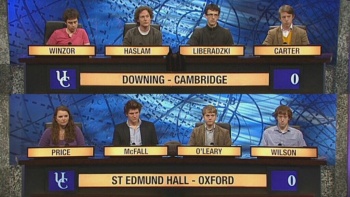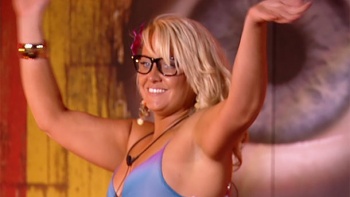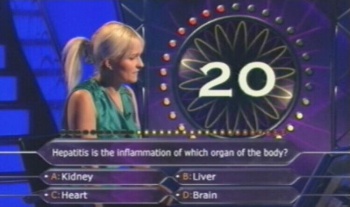Weaver's Week 2010-08-29
Last week | Weaver's Week Index | Next week
This week, the entirely lovely Josie Gibson won Big Brother 11. We were chuffed to bits, really happy for her, and reckon that she's an unstoppable force for Ultimate Big Brother, now in progress.
Contents |
The Boss is Coming to Dinner
RDF for Channel 5, 2-27 August 2010
(This review based on the episodes of 4 and 6 August)
Gameshows on Channel 5 are like buses: you wait years for one to come along, then two arrive at once. This one is narrated by Robert Llewellyn from Scrapheap Challenge when it actually had a scrap heap, and promises to fill the slot vacated by Home and Away in a manner that is almost better than a picture of some flowers and a bit of music.
The basic plot is this. A business owner has a vacancy. We'll stop right there, because surely this is the sort of news event that should be covered by Channel 5's news department? Sadly, Channel 5 hasn't aired anything that meets any sane definition of news since 2006, so it's down to the game show department to provide critical analysis of microeconomic trends, preferably without making a song and dance about it, because Emma Bunton's got that covered.
Where were we? A business owner has a vacancy, and many people have applied to fill it. After reviewing the applications, and weeding out the clearly unsuitable candidates, at least eight people remain in contention. Rather than inviting them in for a traditional interview and assessment process, something different will happen.
Over the course of a couple of weeks, the potential employer will visit all of these people in their homes. There, the candidates will be asked about what they can bring to the job, and will also be expected to prepare and cook a meal for their would-be boss. One candidate from each pair is eliminated from competition: the remaining competitor progresses to the Friday final, where they'll visit the titular boss at their home, and further aptitude tests will take place. After this, a contract may – may! – be awarded.
We've long said that game shows reflect society, they don't make the cultural weather. The Boss is Coming to Dinner is a perfect example. Or it would be, if our internal subeditor hadn't cut ribbons out of a tract by our internal left-wing ranter. Blah blah recession, blah blah bosses looking to make economies, blah blah reduce outgoings, blah blah blah. In summary: is there no such thing as a free lunch? On this show, there is such a thing as a cheap dinner, if you're prepared to freeload on the hopes and aspirations of potential employees.
That's the problem with this show, it feels very exploitative. The titular boss is receiving hospitality from eight candidates, and is judging each of them, at least in part, on their ability to cook. This would be understandable if the job were to do with catering, but it's not really a job requirement for an expensive beauty parlour, as was the case for the sample episodes we saw. "Look at me, I may be rubbish at my job, but I make a wonderful haddock fillet," say the candidates.
Our mood wasn't helped by the way the manager on the shows we saw came over to us as more than a little self-obsessed, concerned primarily about levereging syzergies and cross-promotional opportunities, and name-dropping the salon's clientele. Are we meant to be impressed that they sell their services to faded 90s pop stars and people who we've never heard of? Indeed, are we meant to be impressed by someone who shamelessly takes money from people so that they might conform to an arbitrary, shifting, and unattainable ideal of "beauty"?
But even if the boss concerned wasn't a weak copy of Alan Sugar, we wouldn't be liking this show. It's too exploitative, it's too tacky, and – when we switched off at 6.20 on Friday because we didn't care a fig about the result – it's just too dull.
In short: Come Dine with Me meets The Apprentice, and combines the worst aspects of each.
Who Wants to be a Millionaire 3.0
2 Way Traffic for ITV, Tuesdays from 3 August
Twelve years since it first took to the air, and three years since the last major change, it's time for the venerable Chris Tarrant machine to receive another makeover. Our bottom line is: actually, it might be for the better.
The original game, readers will recall, had fifteen questions of gradually increasing difficulty, with a possible prize of £1,000,000. There were three lifelines, four possible answers, and contenders could walk away after seeing the question and possibilities. An incorrect answer cost some money. The 2007 revamp reduced the number of questions to 12, fiddled about with the double-every-time money tree, and changed the really rather brilliant music.
For the new series, the Fastest Finger First elimination game has itself been eliminated, in favour of contestants recruited through open auditions. It redresses the long-standing bias towards white men, which probably isn't a bad thing. This also means that Millionaire is no longer directly funded by the 0898 premium-rate telephone lines for competitors, and must survive on its own merits. Well, that and what it can bring in from the inevitable viewer's quiz.
The biggest change is the introduction of a clock, limiting the amount of time contestants can spend thinking about the answers to some of the question. The first two questions are simple to the point of childishness, and the contender is allowed just 15 seconds for each of them. The next five questions are somewhat more taxing, and 30 seconds are allowed to respond. If the contestant wishes to play a lifeline on one of these questions, the main clock stops, and resumes when the lifeline has been resolved.
Should a contender reach question seven, and secure a minimum of £50,000, the clock is put away – they have as long as they like for the remaining questions. Instead, there's an extra lifeline, switch the question, where they can dispose of one question completely and take another in its place. There are other changes – the phone-a-friend list is now restricted to three people, and photographs are expected to be provided. And the music is an unsettling amalgam of the Strachan's work and Covalo's remixes.
The net result of this, fairly obviously, is to make the game move a heck of a lot more quickly. While it wasn't unusual to have three contestants complete their run and win about £100,000 between them, it's now possible for five people to appear in the hot seat in the one programme. It's a rapid turnover of people, perhaps a little too quick. There are fewer opportunities for the contestant and host to interact, and most competitors seem happier to sit in silence while the clock's running than to talk through their thoughts – and most of them don't get to play without the tick-tick-tick going on.
If we're being honest, we wonder if Millionaire is turning into The People Versus in its old age. "Quiz me quick" quipped Kaye Adams on the daily version, as contestants turned over at the rate of three, four, five per half-hour. There was a clock in play, contestants had four minutes to give fifteen correct answers. And there were options to Flip a few questions to ones on a subject nominated by the contender.
Overall, we reckon that this is going to speed Millionaire along – for many years it's been gently tootling along in the middle lane, now it's got the confidence to return to the overtaking side of the street. Contestants getting to the million-pound question will still be rare – indeed, six-figure wins are still unusual. We're not entirely sure whether the per-question clock works better than a set aggregate time (say, three minutes) to finish question 7, but it's not obviously worse.
There is one small change we would make, and that's to allow Chris to read the answers before the clock starts. At the moment, he carefully enunciates the question, but gabbles through the answers at breakneck speed. Let him talk slowly and sensibly, and allow the contenders the thinking time.
University Challenge
Round 1, Heat 8: Downing Cambridge v St Edmund Hall Oxford
If this quiz feels like it's turning into the Cambridge University Quiz Society, there's a good reason. Downing are the fifth Cambridge college to appear in the past six weeks, and hope to join Queens', Peterhouse, Newnham, and Christ's College in the second round draw. By comparison, St Edmund Hall are only the second Oxford college to appear, and Balliol also played opposition from the auld enemy.
Where shall we begin? Biography of the week: it's on The Devil, and it's answered by Downing College Cambridge. We'll be abbreviating them as Downing. The college was founded in 1800 with a legacy from George Downing, and we're told it's strong in law and medicine. Alumni include ex-Python John Cleese, Trevor Nunn, and that well-known game show star Michael Winner.
Ah, c'mon, Downing are taking forever to answer their bonuses, then both sides take forever to get another starter right. The T S Eliot fanclub always welcomes an appearance by their favourite poet, the Little Billy Shakespeare fanclub knows that their hero will always get a set of questions. And we'll take Harsh But Fair decision of the week:
- Q: Which adjective describes those visions of society such as Orwell's "1984" and Huxley's "Brave New..."
- Downing, Gareth Haslam: Dystopia
- (No, I'm going to fine you five points.)
- Q: "...World", in which the history of mankind appears doomed; the single word term standing in opposition to "utopian"
- St Edmund Hall, Robin McFall: Dystopian
Thumper did quite clearly ask for the adjective, not the noun, but he really should remember that it's awfully rude to point. Anyway, this means we can talk about St Edmund Hall Oxford, who we'll be abbreviating as St Edmund. Founded in the 13th century, the college has a subtle greeting for its students: one will repeat "Teddy" in triplicate, the other will respond with "Hall" as often. "It's one of those happy mechanisms by which gown does so much to endear itself to town", remarks our host. Ex-students include ex-Python Terry Jones, Robin Day, and Al Murray.
The visual round is on the local names for various security services of former Warsaw Pact countries, including the one from Czechoslovakia. For our younger readers, that's when Czech Republic and Slovakia were one country, with one football team, far better than England's. St Edmund lead 30-20. Geekery of the Weekery is the tale of The Pirate Bay, and we quickly find ourselves asking how many Norwegian playwrights there are.
Downing have the misfortune to get this week's "What Is Thumper Gibbering On About" set of questions, about words separated by a Roman number: from "ion" to "Ixion" is nine, apparently. We regret to report an airpunch by one of the St Edmund team when they get a starter right, if we were in Thumper's seat we'd be awarding a yellow card for that. And for the interminable delays during the subsequent bonuses. The audio round is on film soundtracks, introduced by Mancini's "Pink Panther". After all that, the game is tied at 60-60.
 Downing: Will Winzor, Gareth Haslam, Stephan Liberadzki, Owen Carter
Downing: Will Winzor, Gareth Haslam, Stephan Liberadzki, Owen Carter
St Edmund Hall: Rhian Price, Robin McFall, Gavin O'Leary, Damian Wilson.
Can the mathematician work out the modulus of a complex number? Very much so: 8 and 15 are part of a Pythagorean triple with 17. A starter about minimalist composer John Cage is followed by three more questions about modern minimalist composers. Cor, remember when Classic FM bigged up Henryk Gorecki? Or when quiz show hosts knew that Arvo Part's surname is pronounced "Peert"? St Edmund briefly have a lead, but it goes when Downing tears through the second visual round: albums depicted on postage stamps. The Cambridge side leads by 95-75.
About six minutes to play, and the aggregate score is barely enough to trouble the repechage board. There's more danger of Roger Tilling tripping over his tongue, calling "St Edmund Hall McFall" for many questions. Downing progress with News From 1910, zigging with Spain when the answer's Portugal. St Edmund do well with questions about logarithms, but Downing get to hear Thumper read out lyrics from Oscar Hammerstein musicals. At the gong, Downing are on a bit of a roll, winning as they do by 160-95.
If Newnham didn't get out of second gear in their match a few weeks ago, Downing were confined to third for most of theirs. Everyone got at least one starter, Will Winzor and Owen Carter took four each, but the side had four missignals and a bonus conversion rate of 14/31. St Edmund Hall's six starters were equally divided between Robin McFall and Gavin O'Leary, and 7/18 bonus questions were answered correctly. The overall accuracy rate was 38/74.
Next week: Newcastle v Sheffield
Mastermind
Heat 2
Ann Skillen begins proceedings tonight, with the specialist subject "To the Manor Born" (1979-81, 2007) In this sitcom, the aristocratic Audrey fforbes-Hamilton is left penniless following her husband's unexpected death, and has to sell her estate to wholesale foods magnate Richard DeVere. TV Cream summarises the rest of the plot: "Cue uneasy relationship, muted romance, massive viewing figures" And speaking of massive figures, this contender gets every question right, ending on 17 (0).
Follow that, Rob Cruise! He's telling us about the Life and Career of Lance Armstrong (b 1971), a famous cyclist. He won the World Championship road race in 1993, and after recovering from cancer won the Tour de France in 1999, a title he would retain every year until 2005. He retired after that, but returned to professional cycling in 2009. It's a good round, not quite up to the standard of the previous contender, but 14 (1) is still an excellent score.
Paul Norwood is up next, with Napoleon's marshals. These were the field commanders for Napoleon Bonaparte, ruler of France in the early years of the 19th century. There seem to have been an awful lot of these gentlemen, presumably because M. Bonaparte had lots of sleevies for all of his armies. Poor joke, round is much better: 16 (0).
Paul Steeples is our final contender, he's been swotting up on the Life and Works of Charles Ives (1874-1954), an American composer who believed that great music should be a transcendental experience. His most highly-regarded works were written in the early years of the 20th century, and showed influences both from the European tradition and from quintessentially American works like ragtime and Sousa. His day job as an investment banker may have sapped his strength and contributed to ill-health in the 1920s, freeing him to concentrate on his music. The contender's very lucky to get a question beginning after the buzzer goes, and promptly goes and passes it. 15 (1).
Fourteen and last place? This is a rum contest! Rob Cruise kicks off with the most famous charity from Oxford, before picking up the early career of Mr. David Beckham, the geography of Chesapeake Bay, VAT, the fate of Socrates, and the greatest hit of The Proclaimers. We thought they were a tribute band to our founder. A few errors in there, but 28 (3) is a decent enough score.
Paul Steeples next, he begins with Hamelin, then there's the National Parks of Wales, the festival to end Ramadan, famous MPs for Tatton, a quotation from "Hamlet", everyday life in Sparta, and the Hundred Years' War all feature in the round. He finishes with a question about Brian Lara's 501, and has run up, on his own, a score of 32 (3). Which is better than most members of the England cricket team. Or at least it was on Friday night.
Paul Norwood resumes his round next, kicking off with beach resorts in Los Angeles and the most famous work of Douglas Adams. Well, this column thinks it's reliably unreliable. Questions on the plot of "Phoenix Nights" and the achievement of Catherine Ashton appear in the round, as do parts of the palm and a question on the Lake District. But there are more than a few errors, and 26 (3) is the final score.
So, Ann Skillen needs twelve to take second place and a spot on the repechage board, sixteen to be sure of the win. "Pharaoh" is the first answer, then comes a sunflower, the most famous song from "High Society", the inevitable return of Peter Mandelson, characters in "Mill on the Floss", and a Marquis. There are a fair few passes in the middle of the round, and the contender ends her round on 30 (7).
Paul Steeples earns his place in the ivory tower of the second round. Ann Skillen may yet join her, we won't know for about six months.
This Week And Next
Returning to Big Brother, and it soon became clear that Josie didn't like all these interlopers into her house. Ulrika Jonsson is properly lovely, of course, but John McCririck is capable of winding up everyone, including the Tree o'Temptation, and Josie felt like she was a thorn amongst so many roses. Which was completely wrong, of course, but there's no way of telling some people. By Thursday, Josie was reported to be asking for a phone call with someone from the main series. A similar privilege was granted to John James Parton in the final week, to prevent him from scuppering the delicate four-fold eviction vote.
This column wouldn't be averse to Big Brother making a virtue out of this vice, and borrowing an idea from Millionaire. Allow each housemate a phone-a-friend lifeline they could play once (and once only) in their time in the house. The condition is that the call will be played back to the house, either live or later that day.
No call was made, and Josie followed in the footsteps of John James and Laura McAndrew by getting up and breaking the fire exit in the garden. Her stay in the Ultimate Big Brother house was slightly less than 42 hours. Even at this late date, there are records to be set in the Big Brother experience.
The X Factor returned this week, and fans were aghast when they realised it's not genuine. According to the two or three people with musical training who saw the show, one of the contestants benefitted from the use of Autotune, a process by which even the worst singers can be made to sound approximately in tune. Examples of this technique include Cher's single "Believe", the Olsen Brothers' "Fly on the wings of love" and a distressingly large amount of the current mini-album by The Saturdays.
The general consensus is that this sort of thing is to be deplored, as The X Factor is meant to be a profit-making machine for Simon Cowell. That and a singing competition, not a singing-and-technical-trickery contest. Syco have promised not to use any artificial devices in the main body of the programme, though guest singers on the results show will be allowed to treat their voices however they like, and we still reckon there's an arm going into the small of Louis Walsh's back. The contest will run on until the end of December, and we're idly wondering who to back in the annual Stop Simon Cowell campaign.
Some ratings figures. Celebrity Masterchef ruled the roost in the week to 15 August, 5.1m saw the Thursday competition. Tonight's the Night had 4.65m, and New Millionaire 3.55m. Dragons' Den was level with Odd One In, an unorthodox pairing for 3.2m, and Big Brother peaked with the Friday voting show (2.75m). A photo-finish on the digital channels: Come Dine With Me won on 535,000 ahead of QIXL (500,000), Must Be the Music on The Satellite Channel (475,000), Britain's Got Talent Us The Final on ITV2 (475,000) and Big Brother's Big Mouth (470,000).
The late August bank holiday is a good day to launch the autumn schedule, as people are at home to watch it. So there are new runs of Pointless (4.30, BBC2), Come Dine with Me (5pm, C4), and Coach Trip (5.30, C4), and they continue each day. Monday also sees a Humph Celebration (Radio 4 FM, 12 noon), words and music about the legend. The King is Dead (BBC3, 10.30 Thursday) is a job interview and chat show, and do remember that Ultimate Big Brother continues all week (C4 and E4).
To have Weaver's Week emailed to you on publication day, receive our exclusive TV roundup of the game shows in the week ahead, and chat to other ukgameshows.com readers, sign up to our Yahoo! Group.






